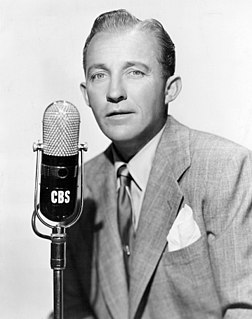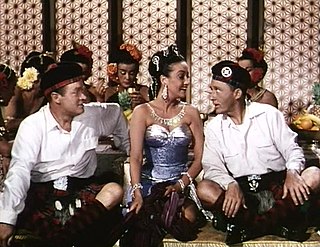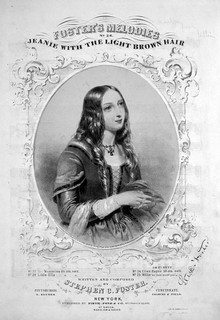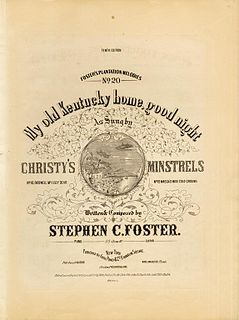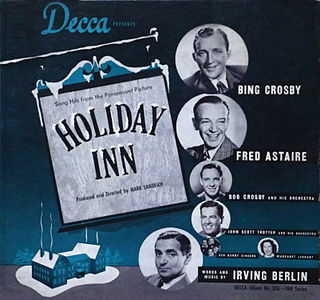
Song Hits from Holiday Inn is a studio album of phonograph records by Bing Crosby and Fred Astaire released in July 1942 featuring songs presented in the American musical film Holiday Inn. These are the longer studio recorded versions of the songs presented in the film. For the songs that were actually in the film, see Holiday Inn (soundtrack). This album is not only notable because it is one of the greatest works of the highly regarded songwriter Irving Berlin, but it is only Crosby's third studio album. This was also the first release of Crosby's signature song "White Christmas" on shellac disc record. The 1942 version would only be released only one more time, in Merry Christmas in 1945 before the song was re-recorded and the later version became the standard.
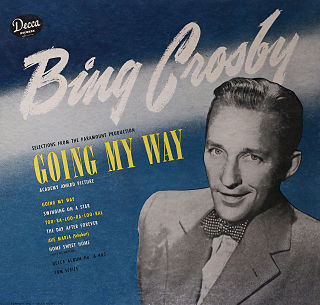
Selections from Going My Way is a studio album of phonograph records by Bing Crosby released in late 1945 featuring songs that were presented in the American musical comedy-drama film Going My Way. This was the first release of one of Crosby's best songs throughout his career, "Swinging on a Star", on shellac disc record.
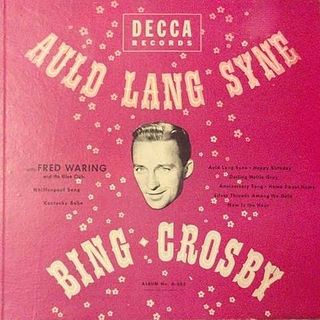
Auld Lang Syne is a compilation album of phonograph records by Bing Crosby released in 1948 featuring songs that were sung by Crosby and also by Fred Waring and his Glee Club. The songs were later presented in 33 1/3 rpm and 45 rpm sets, respectively. This set featured many of Bing's great hits such as: Silver Threads Among the Gold and Now Is the Hour.

Blue Skies is a studio album of phonograph records by Bing Crosby and Fred Astaire released in 1946 featuring songs that were presented in the American musical film Blue Skies. Like Song Hits from Holiday Inn, the entire 78 rpm album would be composed of Irving Berlin songs written specifically for the film. This was the first release of one of Astaire's greatest songs, "Puttin' On the Ritz", on shellac disc record.

St. Patrick's Day is a compilation album of phonograph records by Bing Crosby released in 1947 featuring songs with an Irish theme. This includes one of Crosby's most-beloved songs, "Too-Ra-Loo-Ra-Loo-Ral" which was number four on Billboard for 12 weeks, and topped the Australian charts for an entire month, on shellac disc record. This version, the 1945 re-recording, was released earlier in another Crosby album, Selections from Going My Way.

Favorite Hawaiian Songs, Volume One is a compilation album of phonograph records by Bing Crosby released in 1946 featuring songs that were sung in a Hawaiian-type genre. This was the fourth Hawaiian-themed album release for Crosby.

Favorite Hawaiian Songs, Volume Two is a compilation album of phonograph records by Bing Crosby released in 1946 featuring songs that were sung in a Hawaiian-type genre. This was the fifth Hawaiian-themed album release for Crosby.

Star Dust is a album of phonograph records by Bing Crosby released in 1940 featuring songs that are sung sentimentally, being based upon the 1927 popular song "Star Dust". This album featured his 1939 Decca recording of the song, not the 1931 recording he made for Brunswick.

Don't Fence Me In is a compilation album of phonograph records by Bing Crosby and The Andrews Sisters released in 1946 featuring Country and Western songs. This album contained the enormously popular record "Pistol Packin' Mama", which sold over a million copies and became the first number one hit on the then-new Juke Box Folk Song Records Chart that was later renamed the Hot Country Songs Chart.

Selections from The Bells of St. Mary's is a studio album of phonograph records by Bing Crosby released in 1946 featuring songs that were presented in the American musical comedy-drama film The Bells of St. Mary's.

Bing Crosby – Jerome Kern is a compilation album of phonograph records by Bing Crosby of songs written by Jerome Kern.

El Bingo – A Collection of Latin American Favorites is a Decca Records album of phonograph records by Bing Crosby of Latin American themed songs.

Bing Crosby – The Emperor Waltz is an album of phonograph records by Bing Crosby of songs featured in his film The Emperor Waltz.

St. Valentine's Day is a Decca Records compilation album of recordings by Bing Crosby.

Bing Crosby Sings with Judy Garland, Mary Martin, Johnny Mercer is a Decca Records compilation album of phonograph records by Bing Crosby, Judy Garland, Mary Martin and Johnny Mercer.

Bing Crosby Sings with Lionel Hampton, Eddie Heywood, Louis Jordan is a Decca Records compilation album of phonograph records by Bing Crosby, Lionel Hampton, Eddie Heywood and Louis Jordan.

Christmas Greetings is a studio album of phonograph records by Bing Crosby released in 1949 featuring popular Christmas songs.

Songs from Mr. Music is a Decca Records studio 78rpm album of phonograph records by Bing Crosby, The Andrews Sisters and Dorothy Kirsten of songs from the film Mr. Music, catalog number A-790.

Bing Crosby Sings Cole Porter Songs is a Decca Records studio 78rpm album of phonograph records by Bing Crosby featuring the songs of Cole Porter.

Bing Crosby – Way Back Home is a Decca Records compilation 78rpm album of phonograph records by Bing Crosby featuring sentimental and homely songs.

